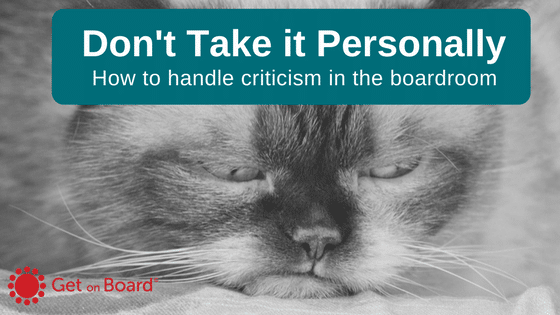Don’t Take it Personally

Hands up if you’ve ever felt personally offended or the ‘victim’ of something someone says to you. Or if you are insulted by disagreement with your ideas. How about when someone does something that they ‘should’ know better not to do?
Yep. I can safely say that I’ve experienced all of that.
Not taking things personally is really hard to do! Thankfully there are many techniques that you can adopt to enable you to remain somewhat detached from your ideas, perspectives, and/or suggestions, to stay focused on the task at hand.
The first step you want to take is to ask yourself why you are feeling this way. What is the story that you are telling yourself about this other person, and why is their perceived opinion of you so important to you?
Examining and rationalising your self-talk in this way may help to ‘normalise’ the other person. For example, if you are feeling intimidated by a fellow board member because they hold a significant position in their professional career or they have an ‘OAM’ or ‘AM’ after their name, understand that these don’t necessarily make them a great board member or any more capable than you in the boardroom.
Further, if you think that someone holds a certain opinion about you, you will look for evidence to re-confirm your belief. This is known as [tooltip tip=”Our tendency to cherry pick information which confirms pre-existing beliefs or ideas.”] confirmation bias [/tooltip]. Ask yourself why you think this person feels this way about you, and why it matters to you so much. Chances are, they don’t share your perspective, and your feelings say more about your insecurities than what the other person actually thinks about you.
If you find yourself starting to take things personally, here are a number of techniques that you can try to bring yourself back to reality.
Have empathy
Put yourself in the other persons’ shoes. Maybe they don’t know how to communicate effectively; particularly if they too are feeling personally attacked or threatened. Perhaps they are like this towards everyone and are crap at interpersonal relationships.
Don’t jump to conclusions.
The other person’s reaction is likely more about them and their ego feeling threatened than it is about you. Ask questions to dig deeper into their perspective and seek first to understand their viewpoint before you share your thoughts.
Know and manage your triggers.
What behaviour really sets you off? Understanding what presses your buttons helps you to manage your reactions, rather than having knee-jerk response that you might later regret.
Mind the gap.
Leave a moment between stimulus and your response. Ask yourself “will this matter in 2 hours/weeks/years”.
Your standards aren’t universal.
Everyone doesn’t share your standards and expectations. Don’t fall in to the trap of expecting everyone to have ‘common sense’ (it’s not common, or often make a lot of sense) and believing that everyone should be behaving in certain ways.
What are you telling yourself?
Critically examine the internal message you keep reinforcing. Does “They disrespect me because I’m not good enough to be on this board. And I really shouldn’t be on this board because I’m not good enough / smart enough / rich enough” sound familiar? Find a way to change the tape. You’re at the table for a reason. Own it.
You’re not there to be friends with everyone.
Be respectful, but don’t expect everyone to sit around holding hands singing kumbaya.
Know that not everything is about you.
Is feeling paranoid a familiar feeling? Do you feel that every whisper, snide comment, or sarcasm is directed towards you? Chances are it is not. If this is a significant challenge for you, read more (here and here) about the ‘spotlight effect’.
Develop your confidence.
Where are you feeling the most uncomfortable in the boardroom? Is it understanding the financials? Setting strategy? Leading change? Appropriately challenging? Whatever it is, invest in your personal development and growth in these areas. Doing so will boost your confidence. Also, doing what it is you’re uncomfortable with will increase your confidence in doing that thing.
Don’t dwell on things.
Focus on doing things that give you life, not what takes away from it.
Check-in on your behaviours.
What you put out into the world comes back to you. If you notice that more people than not treat you in a certain way, it could be because you’ve got some behavioural blind spots that need illumination. Doing so will help you to start making positive changes.
Vent and debrief with a trusted person.
Sometimes a good vent is required after a really stressful board meeting or encounter with a fellow board member. Do this with an independent and trusted person who can take your vent one step further by talking through how the whole thing went down and where you may be able to make improvements on your part in the situation.
Maintain a positivity reserve.
Keep all of those nice emails and messages that people have sent you over time so that you can refer back to them when you’re feeling down in the dumps. Reading through these will pep you up in no time and remind you of all of the ways you’re awesome.
Candid discussions and creative abrasion in the boardroom can put even the most seasoned board member off their A-game. Knowing how to effectively manage the times when we feel like our ego takes a blow builds our resilience and allows us to stay out of self-pity mode to focus on the task at hand. And that’s for the betterment of the organisation and community it serves.
